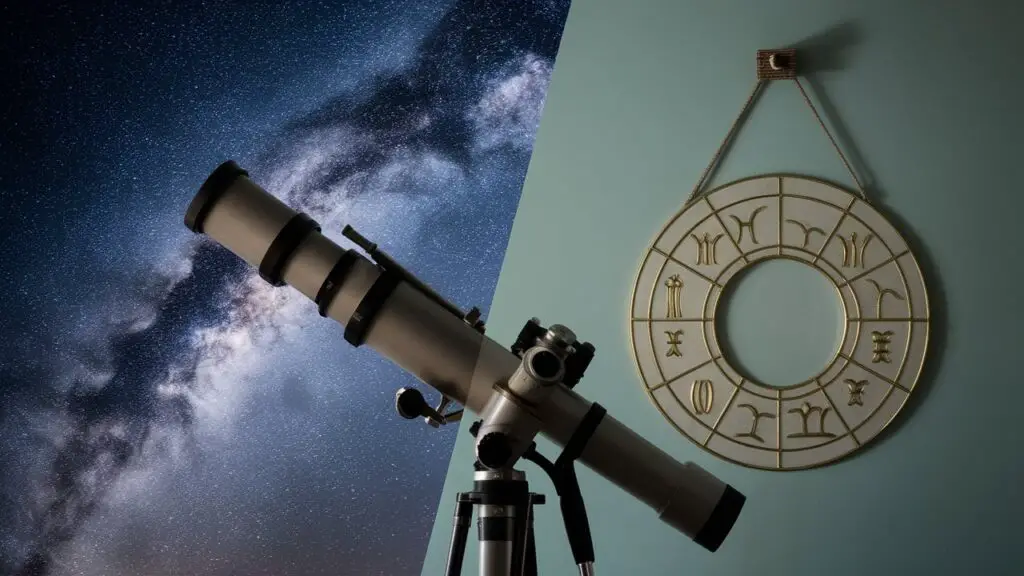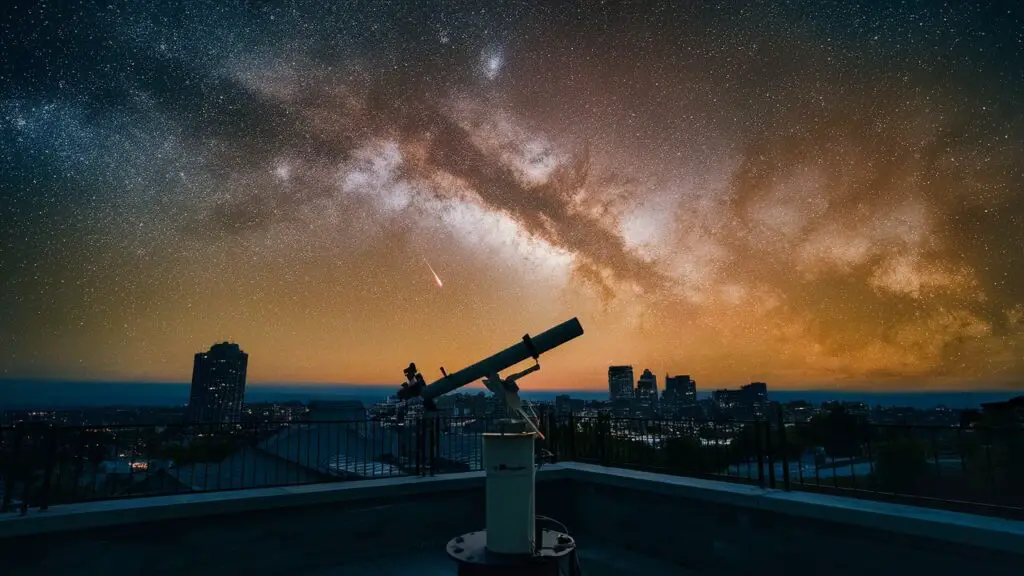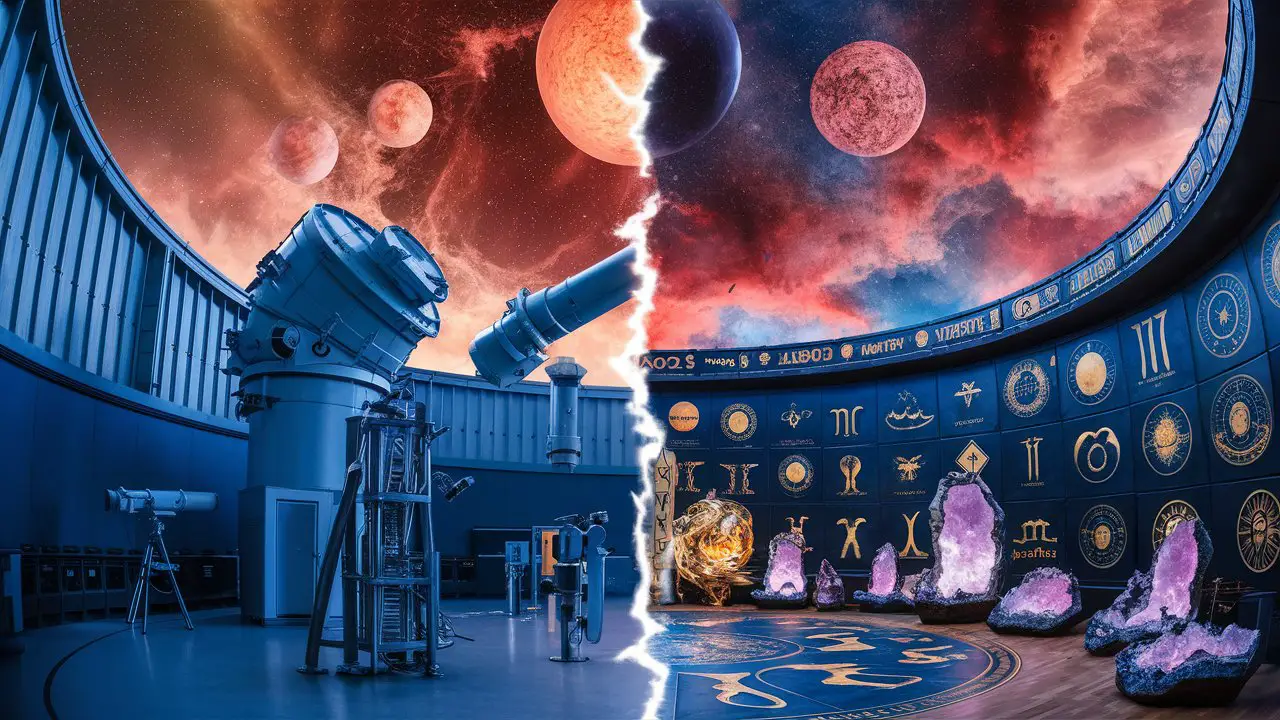As a curious soul, you likely find yourself gazing at the cosmos in wonder. The intricate dance of the stars and planets is mesmerizing yet mysterious. However, confusion may arise when trying to distinguish between the practices of astronomy and astrology. While both relate to celestial bodies, there are distinct differences. As you read this article, be prepared to separate fact from fiction. We will navigate common myths and misconceptions to gain clarity on astronomy’s scientific nature versus astrology’s mystical approach. With an open and discerning mind, you will walk away with knowledge to better understand these fascinating fields.
Defining the Difference: Astronomy vs Astrology
The Scientific Study of Astronomy
Astronomy is the scientific study of the universe and all that it contains, including the movements and physical properties of celestial objects like the sun, moon, stars, and planets. Astronomers explore the universe and develop theories based on observations and experiments to understand its origin, evolution, and workings. Astronomy relies on the scientific method and is considered a physical science.
The Pseudoscience of Astrology
In contrast, astrology is the pseudoscience that claims there is a correlation between the positions and movements of celestial objects and human affairs. Astrologers believe that the positions and movements of the sun, moon and planets at the time of a person’s birth shape their personality and destiny. However, there is no scientific evidence to support astrological claims. While astronomy is based on the scientific method, astrology is considered a pseudoscience by the scientific community.
Common Misconceptions
A common misconception is that astronomy and astrology are the same. However, they differ significantly in their approach and subject matter. Astronomy aims to understand the universe and celestial objects through scientific observation and theory. Astrology aims to predict human affairs and events based on the positions of celestial objects, despite there being no evidence to support these claims.
In summary, astronomy and astrology are very different fields. Astronomy is the scientific study of the universe, while astrology is an unscientific belief that celestial objects influence human lives. Understanding the distinction between these two fields is important to gain a clear perspective on how we study and understand the universe.
Astronomy: The Scientific Study of Space
The Night Sky
Astronomy is the scientific study of the universe and all that it contains. For thousands of years, humans have gazed up at the night sky and wondered about the celestial bodies they observed. Ancient astronomers studied the motions of the Sun and stars to understand patterns and make predictions. Today, astronomers use advanced technologies like telescopes, cameras, and spectrographs to observe the universe and understand its origins and workings.
The Universe and Beyond
The universe contains billions of galaxies, each with billions of stars, as well as interstellar dust and gases. The Milky Way galaxy alone contains 200 billion to 400 billion stars. Astronomers study the life cycle of stars, from birth to death, as well as exoplanets, black holes, nebulae, and distant galaxies. Powerful space-based telescopes like the Hubble Space Telescope provide views into the deepest reaches of space. Astronomers analyze the light from celestial objects to determine their motion, temperature, chemical composition, and other properties.
Advancing Scientific Knowledge
Astronomy has led to many important discoveries that have advanced scientific knowledge. Studies of the solar system have revealed insights into how the planets formed and evolved. Observations of distant supernovae showed that the expansion of the universe is accelerating, leading to the discovery of dark energy. Measurements of the cosmic microwave background radiation confirmed predictions of the Big Bang theory. Astronomy will continue to push the frontiers of science as more advanced technologies come online to peer deeper into the universe.
Studying the universe through astronomy has revealed some of the greatest scientific mysteries and helps us understand our place in the cosmos. The night sky is filled with wonders, and astronomers will continue exploring the unknown to gain insights into how it all began.

Astrology: Interpreting the Stars for Insight
The Origins of Astrology
Astrology has ancient origins, dating back over 2,000 years. Early astrologers believed that the positions and movements of celestial objects could provide insight into human affairs and events on Earth. They thought that the planets and stars influenced a person’s destiny and future. Astrology was considered a scholarly tradition for centuries alongside astronomy, its scientific counterpart.
How Astrology Works
Astrologers construct birth charts based on the positions of the sun, moon and planets at the time of a person’s birth. The birth charts are interpreted to gain insights into a person’s personality, relationships, and life events. Astrologers believe that the positions of the planets and the relationships between them reflect a person’s attributes and destiny. For example, the position of the sun is thought to indicate a person’s core self and life purpose. The moon’s position is believed to reflect emotional needs and instincts.
No Scientific Basis
There is no scientific evidence that astrology can accurately predict events or a person’s future. Numerous scientific studies have found no correlation between astrological predictions and reality. Astrology is considered pseudoscience – it has the appearance of science but lacks scientific validity or reliability. While astrology has been an important part of human culture and spirituality for centuries, the mechanisms proposed to explain how it might work have no logical or scientific basis.
In summary, astrology seeks to find relationships between celestial positions and human affairs. Despite its long history and cultural influence, astrology has been shown to have no scientific validity as a predictive system. For entertainment or as a creative thinking tool, astrology may have value to some. But there is no evidence it can provide real insight or accurately predict a person’s destiny.
Common Myths and Misconceptions
Astronomy and astrology are frequently confused, though they differ significantly in their areas of study and methodology. Astronomy is a science that focuses on the observation and understanding of celestial objects and phenomena, while astrology is considered pseudoscience that claims the positions and movements of celestial bodies can influence human affairs and events on earth.
Myth: The Zodiac Signs Influence Personality and Events
Perhaps the most well-known myth is that one’s zodiac sign, based on the constellation the sun was in at birth, determines personality or affects the events in one’s life. There is no scientific evidence that the constellations have a causal influence on people and events on Earth. The constellations are formed by visually connecting stars that can be vast distances apart and have no physical relationship.
Myth: The Planets Control Our Destiny
Another common myth is that the positions and movements of the planets at the time of one’s birth shape one’s destiny and future events. However, there is no known mechanism by which the planets could influence events on Earth or the lives of individuals. Their gravitational and electromagnetic effects are negligible for human life on the surface. The forces acting within the human body are vastly greater than any effects from celestial bodies.
Myth: Astrological Predictions Are Accurate
Proponents of astrology often claim that astrological predictions of future events and personal outcomes are accurate and scientific. However, numerous scientific studies of astrological predictions have found no evidence to support these claims. Controlled tests of astrologers’ abilities to predict future events or personal outcomes have yielded results no better than chance. There is no evidence astrological methods can predict the future or gain insight into people’s lives with any real accuracy.
In summary, while astronomy and astrology share some historical connections and common references to celestial objects, they are very different in their scientific validity and methodology. Astronomy is a scientifically valid field of study, while astrology is considered pseudoscience.
Astronomy Facts vs Astrology Beliefs
Astronomy is the scientific study of the universe and celestial bodies. Astronomers use the scientific method to develop theories and test hypotheses to better understand the cosmos. Unlike astrology, astronomy relies on empirical evidence and observation, not faith or divination.
The Solar System and Beyond
Astronomers have discovered that our solar system consists of the Sun and everything that orbits around it, including planets, moons, asteroids, and comets. Telescopes and spacecraft have revealed fascinating details about our solar system and beyond, detecting thousands of exoplanets in other star systems as well as gaining insights into black holes, neutron stars, and the expansion of the universe.
Understanding the Universe
Astronomers use the laws of physics and chemistry to understand the origins of the universe and how it evolved over nearly 14 billion years into its present state. The Big Bang theory is supported by multiple observations, like the cosmic microwave background, that provide evidence for the universe’s hot and dense early state. Astronomers continue to refine theories like the Standard Model of cosmology to match new observations.
In contrast, astrology is a pseudoscience based on the belief that the positions and movements of celestial bodies like the stars and planets exert an influence over human affairs and terrestrial events. Astrologers claim that the positions of the Sun, Moon and planets at the time of a person’s birth shape their personality and destiny. However, there is no evidence to support astrological claims, and astrology cannot be empirically tested or proven using the scientific method. While astronomy enlightens us with evidence-based insights into the workings of the universe, astrology promotes supernatural beliefs not grounded in reason or science.
In summary, astronomy and astrology differ fundamentally in methodology and evidence. Astronomy is a scientific field of study, while astrology is considered a pseudoscience by the majority of scientists. Understanding this key distinction can help avoid conflating astronomy’s factual discoveries with astrology’s faith-based claims.
Don’t Miss Out on Wealth-Building Secrets: Read The Wealth Signal!

Conclusion
As we have explored, astronomy and astrology have very distinct histories and purposes. While both fields study celestial objects, astronomy relies on scientific observation and astrology applies symbolic meaning. As an informed reader, you now have a grasp of these differences. With an understanding of astronomy’s role in expanding knowledge of our universe through objective discoveries, you can appreciate its contributions. Similarly, an awareness of astrology’s role in exploring human experiences through ancient frameworks gives you insight into its significance for many. Armed with the ability to distinguish these two pursuits, you are better equipped to identify credible sources in astronomy and view astrological interpretations as more subjective reflections. Though distinct, both fields compel us to contemplate our place in the grand cosmic order.





